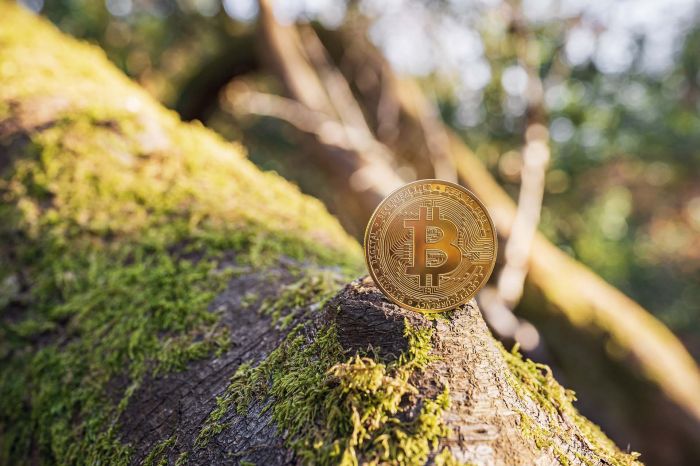Let´s make three things clear
Before I dive deeper and look at the overall situation regarding Bitcoin and Greenpeace, I want to make three things very clear. First of all, I believe that climate change is very real and we need to do something with it now. The problem is without any doubt pressing and I believe it would be unwise to turn our backs on it.
Second of all, like most supporters of Bitcoin, I am very well aware that Bitcoin uses energy in the process of Proof-of-Work (mining). You will never see anyone who truly understands this technology deny this fact, nor will they try to hide it. Bitcoin is very transparent in every possible way and the environmental impact of mining is one of them. Compared to other industries where there are hardly any standards on reporting of their carbon footprint/climate impact or there is a lack of transparency in their reporting process, Bitcoin is doing tremendously well.
Last but not least, this is by no means an attack on anyone, who is genuinely trying to solve climate change problem. This is just an explanation of why the steps that Greenpeace took might not be the best. I have also tried to provide as many different resources as possible, so everyone can go ahead and verify the facts or learn more about this topic.
Starting with the basics
If you have no idea, what happened, here is a short summary of what we learned at the beginning of this week. To put it very simply, Greenpeace USA and Environmental Working Group created Change the Code campaign, which basically wants to change the code of Bitcoin, so that it moves away from Proof-of-Work and implements Proof-of-Stake consensus mechanism. They were joined by Chris Larsen, crypto billionaire and Executive Chairman and co-founder of Ripple (XRP), who stated that he will be donating 5 million dollars for ad campaigns that are expected to be running in New York Times, Politico, The Wall Street Journal, Marketwatch and Facebook.
The goal of these ads will be to “educate” society on the problems connected to the Proof-of-Work, while also trying to put pressure on people like CEO of Tesla, Elon Musk, CEO of Block, Jack Dorsey or CEO of Fidelity, Abby Johnson. Why these people? Well because according to this initiative, these people (and couple dozen others) are what it takes to change the code and push Bitcoin to change from PoW to PoS. And why would anyone want to propose this? Well everything necessary is highlighted in the video below:
Great video wouldn’t you agree? Well, I wouldn’t. And countless others do not agree as well, which was very visible by the storm of comments, analysis and fact checks that were seen all around the Twitter and other platforms or media outlets. Where did it all go wrong for Greenpeace?
1.Bitcoin vs. Sweden: comparing apples-to-oranges
While comparing Bitcoin or other cryptocurrencies to countries has become almost an industry standard, doing so is simply comparing apples-to-oranges. One of the very first official sources, which has done this was Cambridge Centre for Alternative Finance, who created widely used CBECI index.
However, even they make it very clear that comparing Bitcoin to countries (like Sweden) is not the best analogy. One of the only reasons why they are doing it is so that ordinary people can become well aware of what the impact of Bitcoin is. Yet, this comes with a cost and that is that the comparisons can not be take seriously. Why?
Well, because while we can easily define what Sweden (or insert any other country that is compared to BTC) is, defining Bitcoin is different for different people. Some will define it as global monetary network. Others will define it as a settlement tool, while others will say that it is Ponzi scheme or rat poison (yes Buffett and Munger, we have not forgotten).
And while the goal of this article is not to decide on the value or definition of Bitcoin, the comparison of Bitcoin to countries is definitely not something that can be used as a proper argument if someone wants to propose such a significant change to its protocol. It is literally like comparing apples to oranges.
2.Bitcoin alone could help warm planet by 2°C
The whole initiative has another problem. And that is the use of irrelevant or even refuted sources of information. The supporters of this initiative state that Bitcoin alone could help warm the planet by 2°C.
People familiar with the matter know that this argument is based around a study of Mora et al. 2018, which was, however, refuted on many occasions. Nevertheless, Greenpeace used it as a sole study to build their arguments around. There have been many studies that have completely refuted the findings of Mora et al., which only brings questions about the incentives of what is Greenpeace trying to do with this initiative. Having one refuted study simply cannot be enough, if there are many studies clearly stating that the information value of Mora et al. is, well, close to 0. One such piece was written, for instance, by Masanet et.al 2019, who state the following:
“Mora et al. scenarios are fundamentally flawed and should not be taken seriously by researchers, policymakers or the public.”
And that was in 2019. In 2022 we know, that not only is Bitcoin not bad for the environment, its mining can actually bring helpful switch to renewable energy. Not only that, it also helps to solve problems like flaring or utilization of stranded energy, as pointed out by climate change physicist Jyn Urso:
“Bitcoin miners monetize the capture of flared gas, which is a 100 % combustion conversion from CH4 to CO2 and H2O. This generates electricity to operate the mining equipment. While this releases CO2 emissions, this is better than releasing methane directly into the atmosphere. Methane is 84x better at trapping heat than CO2 over a 20-year period.”
For more sources on this topic, follow this link or this link.
3.Change the code – sure, go ahead
To solve for all these problems and for all the “bad” that Bitcoin and its Proof-of-Work is doing to our planet, the initiative wants to change the code of Bitcoin. While the previous arguments presented by them were flawed, refuted or outdated, I think that this one is by far the most irrational. And that is for many reasons.
First of all, if they honestly believe that PoW is doing so harmful to the environment, they are more than welcome to fork Bitcoin and create “Green Bitcoin,” “Clean Bitcoin” or whatever they want to call it. Bitcoin is open-source which means that anyone can do whatever they want with the code, but it does not mean that people will follow. And in this case, the vast majority would definitely not follow. While I can imagine that maybe, maybe some people would follow this, vast majority will support Bitcoin, as we have seen in many cases before.
Secondly, Greenpeace argues that about 50 people and organisations (including Jack Dorsey, Elon Musk or Fidelity) are needed to change the code. This only shows, how little they understand Bitcoin and Proof-of-Work. If Bitcoin was running on Proof-of-Stake, then yes, maybe it would be the case and the largest bagholders would be able to do any changes they wanted. But with PoW, it is much more complicated than this, which is also one of the reasons why the change from PoW to PoS is extremely unlikely.
“I’d put the chance of Bitcoin ever moving to PoS at exactly 0%. There is no appetite among Bitcoiners to destroy the security of the protocol by making such a move.”
Those are the words of Chris Bendiksen, Bitcoin researcher for CoinShares. If the change in code was as simple as they imagine, then in 2017, where we witnessed the so called blocksize war, Bitcoin protocol would have been changed and Bitcoin Cash would not be created as a fork. Which is the third problem with their logic. As we can see, Bitcoin Cash, along with many other forks like Bitcoin SV, are not even close to doing so well as Bitcoin, showing that the support for Bitcoin forks is simply not there. The support of the community is simply not there once you alter the code, because to many, “the code is the truth.” If you want to know more about this topic I can highly recommend a book by Jonathan Bier, The Blocksize War.
Conclusion
And while I can probably ramble about many other problems with this initiative, I feel like the arguments presented are already enough to at least question the stance of Greenpeace, if not reject it at all. The very nature of this decision is questionable, and so are its reasonings and facts that are supposed to support it. But those are just my two cents so if you want to study this topic on your own, I would advise you to use any of the following links:
- Great take on this whole topic by Bitcoin Magazine
- A piece written by Nic Carter, where he refutes several points connected to this problematic
- How does PoW work and why is it efficient?
- Concerns about Bitcoin´s electricity use
- How BIPs (Bitcoin Improvement Proposals) work
- Willy Woo also ran some numbers and showed how this mistake can be costly for Greenpeace
I am also adding a version of the above-mentioned video in a format, which makes a bit more sense:












Comments